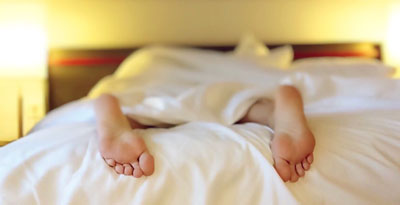Do you know if you grind or clench your teeth while you sleep?
 Here are some ways to tell.
Here are some ways to tell.
I’m just stressed, I’m just an uptight person, I don’t sleep well, etc. Common “explanations” by those who use dental nightguards (and their dentists) for their clenching and grinding. It’s being shown that there IS probably a diagnosis rather than “naming” the symptoms “clenching and grinding” of this sleep disorder.
Damage to teeth, bone loss and gum disease are common sequela of nighttime tooth grinding and clenching. Pain in the jaw muscles, TMJ, neck, ears, and headaches can also be painful consequences requiring medication or treatment..
As more studies are looking into this age-old condition it is becoming obvious that the causes are often treatable rather than trying to “cover up” or treat symptoms (bruxing and clenching) with nightguards, or the damage it causes (gum surgery, root canals, medication, sleeping pills).
Evidence suggests the majority of nighttime bruxing and clenching is often a sign of either a sleep breathing disorder (snoring, sleep apnea) or a TMJD (jaw joint problem) or both.
Grinding and clenching are associated with micro-arousals from sleep and can also contribute to daytime fatigue, chronic facial and neck pain, poor concentration, or a host of other sleep-deprivation symptoms.
Grinding and clenching actually changes the muscles that are being used, similar to training other muscles. Over time the muscle fibers generate less force (lactic acid buildup) but may trigger the muscle to “grow” additional muscle fibers to “spread out the work” of bruxing/clenching all night.
A recent study excluded (for its specific purpose) patients with diagnosed conditions from the “undiagnosed” bruxers/clenchers the following;
- 15% were using medication for muscle pain/tension/sleep
- 12% were in orthodontic treatment (probably teenagers and younger) or speech therapy for jaw/tongue problems
- 12% had TMJ problems
- 7% had diagnosed sleep apnea.
This shows that 46% of a random sample of over 500 people identified as being nighttime “bruxers or clenchers” already had diagnosed conditions now known to be causative factors of nighttime grinding/clenching. Each month, articles are showing that traditional dental nightguards can worsen TMJ problems, worsen sleep breathing problems (sleep apnea and snoring) are being published the routine use of a nightguard should be re-examined in the dental profession. Up to 70% of bruxers/clenchers are reported to have either TMJ or Sleep Breathing problems.
If you wear a nightguard and haven’t been evaluated for a TMJ disorder or sleep apnea, you should be. Find a dentist, such as myself who specializes in TMJD and Sleep Apnea to evaluate you. Treating the underlying cause will help lessen the damage to the joints, teeth, and muscles over the years.
Palinkas, M., et al; Impact of sleep Bruxism on masseter and temporalis muscle bite force; Cranio 2016, Vol 34, No 5



